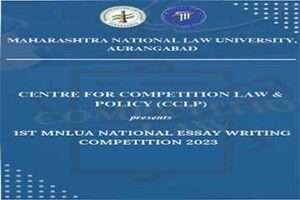Poetry, Pedagogy and Profession: Understanding Rhyme and Reason across Cultures organized by Rajiv Gandhi National University Of Law, Punjab in collaboration with Mary Immaculate College, University of Limerick, Ireland Intercultural Poetry and Performance Library, Kolkata & Manipal University, Jaipur
About Host
Rajiv Gandhi National University of Law (RGNUL), Punjab
The Rajiv Gandhi National University of Law (RGNUL), Punjab, was established by the State Legislature of Punjab by passing the Rajiv Gandhi National University of Law, Punjab Act, 2006 (Punjab Act No. 12 of 2006). The Act incorporated a University of Law of national stature in Punjab, to fulfill the need for a Centre of Excellence in legal education in the modern era of globalization and liberalization. RGNUL started functioning from its Headquarters- Mohindra Kothi, The Mall, Patiala w.e.f. 26 May 2006. The University acquired approval from the Bar Council of India (BCI) in July 2006. The University also got registered with the University Grants Commission (UGC), New Delhi under Section 2(f) of the University Grants Commission Act, 1956, and has been declared fit to obtain a grant from the (UGC) under Section 12-B of the UGC Act, 1956. RGNUL operated from the heritage building of the erstwhile Patiala State, Mohindra Kothi, The Mall, Patiala (from 2006 to 2013) located in the heart of Patiala city in a pollution-free environment. The University was accredited with an ‘A’ Grade by National Assessment and Accreditation Council (NAAC) in 2015. RGNUL, Punjab was granted autonomy under UGC Regulations, Clause 5 Dimensions of Autonomy for Category-II Universities in April 2018. The Ministry of Human Resource Development, Government of India, ranked RGNUL the first amongst the cleanest Higher Educational Institutions, Swachh Campus (2019) in the category of Government Residential Universities.
About Sponsor
State Bank of India
State Bank of India (SBI) is an Indian multinational public sector bank and financial services statutory body headquartered in Mumbai, Maharashtra. SBI is the 43rd largest bank in the world and ranked 221st in the Fortune Global 500 list of the world’s biggest corporations of 2020, being the only Indian bank on the list It is a public sector bank and the largest bank in India with a 23% market share by assets and a 25% share of the total loan and deposits market. It is also the fifth largest employer in India with nearly 250,000 employees. The bank descends from the Bank of Calcutta, founded in 1806 via the Imperial Bank of India, making it the oldest commercial bank in the Indian Subcontinent. The Bank of Madras merged into the other two presidency banks in British India, the Bank of Calcutta and the Bank of Bombay, to form the Imperial Bank of India, which in turn became the State Bank of India in 1955. Overall the bank has been formed from the merger and acquisition of nearly twenty banks over the course of its 200-year history. The Government of India took control of the Imperial Bank of India in 1955, with the Reserve Bank of India (India’s central bank) taking a 60% stake, renaming it the State Bank of India.
Objectives and Learning Outcomes
The Capacity-building Programs in higher education institutes aim to develop and strengthen the skills, instincts, abilities, processes, and resources that organizations and communities primarily require to survive, adapt, and thrive in the rapidly changing world. Universities are centers of capacity-building through research, analysis, and innovation. Capacity-building Programs at Rajiv Gandhi National University of Law (RGNUL), Punjab focus on the transformation that can be generated from within.
This transformation goes beyond the performance of tasks to mold mindsets and attitudes. The Higher Education System greatly relies on active learning for the development of character and knowledge in the present globalized world. In order to establish internal capacity, impart holistic education, cater to the needs of the community, and implement the NEP 2020 mandate of enhancing skills, RGNUL, Punjab shall host 5-day Capacity-Building Program Poetry, Pedagogy, and Profession: Understanding Rhyme and Reason across Cultures (20-25 August 2022). The objective of this program is to elevate excellence in academics and research as well as enhance the competence of academicians, researchers, professionals, students, and lifelong learners.
It is important to conduct such capacity-building programs as the escalation of artificial intelligence in digital times has greatly challenged the ability of human beings to think critically. The governance of experience by software and algorithm has transformed the way in which human beings perceive the world. The new communication technologies impact the pedagogical requirements of the times. While digital tools facilitate various processes of learning, the excessive use of smart devices threatens critical thinking skills. The process of critical thinking relies on universal values. Critical thinking is an active process of synthesizing, analyzing, and evaluating information and experiences. Interpretation of rhyme and reason enables learners to develop critical thinking. The teaching of poetry, and performance in words, enhance skills for better communication and provides insights to understand the ways of the world. The study of poetry develops the cognitive skills of learners. It fosters a culture of good reason and prudence which is the need of the hour.
The Department of English and Public Relations, Rajiv Gandhi National University of Law (RGNUL), Punjab in collaboration with Mary Immaculate College (MIC), University of Limerick, Ireland, Intercultural Poetry and Performance Library (IPPL), Kolkata and Manipal University, Jaipur shall be organizing Capacity-Building Program Poetry, Pedagogy and Profession: Understanding Rhyme and Reason across Cultures (20-25 August 2022). The event aims to promote reading, writing, and teaching of poetry as well as fortifying the competencies of the participants. This unique program shall maximize the talent and critical abilities of academicians, researchers, students, and professionals.
About Collaborators
Mary Immaculate College – University of Limerick
Mary Immaculate College, founded in 1898, is a University-level College of Education and the Liberal Arts, academically linked with the University of Limerick. The College is a multi- campus institution, with a student population of over 5,000 students enrolled in undergraduate programmes in Primary and Post-Primary Education, Liberal Arts and Early Childhood Care and Education, as well as a range of postgraduate programmes at Diploma, MA and PhD levels.
Intercultural Poetry and Performance Library
The Intercultural Poetry and Performance Library (IPPL) is a non-profit organization that aims to generate academic interest towards poetry, nurture creativity and reading habits. The IPPL is committed to bringing poetry to the heart of the nation. Luminaries like Sankha Ghosh (Former President, Advisory Board), Bashabi Fraser (Chief Ideator and President, Advisory Board), Sanjukta Dasgupta (President), Jaydeep Sarangi (Vice President) are associated with IPPL.
The Intercultural Poetry and Performance Library, Kolkata draws on the model of The Scottish Poetry Library in Edinburgh, Scotland. Conceptualized as a unique national resource centre of recognized excellence for poetry, the Intercultural Poetry and Performance Library boasts of a pan Indian outlook and aspires to become a veritable home of creative minds—to bring people and poems together nationally and forge lasting ties with the international writing community, thus building a worldwide audience for Indian poetry, and an audience for international poetry in India. A firm believer in the power of the pen, the IPPL also seeks to find avenues of exchange between poetry, translations of poetry from different Indian languages and other forms of visual & performing arts so as to heighten the impact of the arts on contemporary life and society and make poetry and the arts the means of societal uplift and intercultural exchange as well.
Manipal University, Jaipur
The Manipal Education and Medical Group is an established leader in the field of education, research and healthcare. In a span of over six decades, it has transformed the lives of more than 3, 00,000 students from over 59 countries. The group includes five Universities – Manipal Academy of Higher Education (MAHE, Karnataka), Sikkim Manipal University (Sikkim), American University of Antigua (Caribbean Islands), Manipal International University (Malaysia) and Manipal University Jaipur (Jaipur). Manipal University Jaipur (MUJ) was launched in 2011 on an invitation from the Government of Rajasthan, as a self-financed State University. MUJ has redefined academic excellence in the region, with the Manipal way of learning; one that inspires students of all disciplines to learn and innovate through hands on practical experience.
Registration Details
- Faculty/Academicians & Professionals Rs. 2000/- + GST
- Students and Research Scholars Rs. 800/- + GST
- Institutional Registration Rs. 2000/- + GST (For 3 to 5 students of same or different institutes) E- Certificates shall be given to participants.
Registered Students can earn extra credits (02) and are eligible for Course Certificate on fulfilment of assessment criteria which includes submission of Response Paper 2000-3500 words to expressions@rgnul.ac.in and feedback form (within stipulated time, announced during the sessions). The certificate shall be issued by RGNUL.
Note: No Registration Fee for RGNUL Students and Faculty & International Participants
An Accounts Payment link is attached below where participants are required to register. Only after completion of the payment will the joining link and schedule be sent on the registered email ID.
The schedule for the event will be available on the www.rgnul.ac.in.
https://www.rgnulerp.org/lsa/eventPortal/loginFrom.jsp
Targeted Audience
- Academic Community
- Language and poetry researchers
- Poets
- Language Experts
- NGOs and Registered Societies
- Students
- Literature and Language enthusiasts
Organising Committee
Organising Secretary
Dr. Navleen Multani, Assistant Professor in English, Public Relation Officer, RGNUL, Punjab expressions@rgnul.ac.in
Public Relations & Dept. of English RGNUL, Punjab
Student Convenor
Pranit Singh, 3rd Year Student, Rajiv Gandhi National University of Law, Punjab Pranitsingh20164@rgnul.ac.in, Phone Number: 9353325035
Student Co-coordinators
Divisha Gora: divishagora21113@r gnul.ac.in
Charvi: charvi21129@rgnul.ac.in
2nd Year Students Rajiv Gandhi National University of Law, Punjab
Previous Posts
ASA Legal Competition: Legal Article/ Essay Writing Competition
Online Certificate Course On Contract Drafting
National Seminar On Environmental Law & Policy By AGISS Research Institute & MVN University
Judicial Assistant at National Green Tribunal (NGT)
First edition of Samyat National Client Counselling – Negotiation competition, 2022
Fireside Chat with Accords International and Kathleen Leedy on Unlocking The Deadlocks in Mediation
Keywords
Poetry, Pedagogy, and Profession, Poetry, Pedagogy, and Profession: Understanding Rhyme and Reason across Cultures




